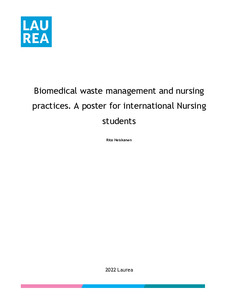Biomedical waste management and nursing practices. A poster for international Nursing students
HEISKANEN, RITA (2022)
HEISKANEN, RITA
2022
All rights reserved. This publication is copyrighted. You may download, display and print it for Your own personal use. Commercial use is prohibited.
Julkaisun pysyvä osoite on
https://urn.fi/URN:NBN:fi:amk-202202182613
https://urn.fi/URN:NBN:fi:amk-202202182613
Tiivistelmä
Effective management of different waste types is an essential management element of responsible healthcare sector. In average, these wastes account to 15% of the total volume generated by healthcare activities. For example, the wastes from hospitals are many times potentially special or even dangerous material requiring special attention and increased attention to manage and poses a serious health threat to healthcare providers, patients, the public and environment if improperly managed. Consequently, it is advisable that the different waste types from health care sector are also understood by the staff of different health care centers. However, it is not the case always.
Depending on the context, the waste produced in the healthcare sector is referred as biomedical waste (BMW) or special healthcare waste. The concepts and their definitions vary also internationally and nationally. Nevertheless, nurses should know quite thoroughly these different types of healthcare waste types produced in hospitals and other healthcare units nationally. The main aim of this bachelor thesis is to educate international nursing students about these basic special waste types of the health care sector. National rules and guidelines of waste management in hospitals are in Finnish.
Consequently, international nursing students need the information especially in a language they can easily understand. So, English (Curriculum language, too) was used in the poster but the key concepts were also added in Finnish.
This is a practice-based type of bachelor thesis, including a report and a tangible end-product. Specifically, this thesis creates an educational poster regarding to biomedical waste management based on national rules and guidelines. The target group is international nursing students at Laurea University of Applied Sciences.
Research questions formulated for this study are the following ones:
a. What kind of biomedical wastes are commonly generated/addressed by nurses at work?
b. How are the biomedical waste collected and sorted at Finnish hospital facilities?
c. Which nursing practices contribute to waste minimization?
The study applied a learning by developing (LbD) research approach. The theoretical background information and poster
content was based on thorough literature review. As part of a LbD research approach, co-creation was one methodological key, too. The final poster was developed in close collaboration with supervisors and fellow students. It
illustrates the most important healthcare waste types commonly addressed by nurses at practical work. For example, the international nursing students learn about sharps, unidentifiable and identifiable biological waste, infectious waste and pharmaceutical waste. Additionally, they learn about waste minimization and occupational safety. The overall feedback from international nursing students was very positive.
As a brief conclusion, this poster had a good impact on the international nursing students to become more environmentally aware and ecofriendly. It also makes it easier to integrate into working life. Both the thesis and the
poster are useful sources for international nursing students to learn more about healthcare waste management and waste minimization in Finland.Summing up,this will lead international nursing students to achieve environmental, economic, public and even personal benefit. Everyone wins when the recycle economy is functioning efficiently.
Depending on the context, the waste produced in the healthcare sector is referred as biomedical waste (BMW) or special healthcare waste. The concepts and their definitions vary also internationally and nationally. Nevertheless, nurses should know quite thoroughly these different types of healthcare waste types produced in hospitals and other healthcare units nationally. The main aim of this bachelor thesis is to educate international nursing students about these basic special waste types of the health care sector. National rules and guidelines of waste management in hospitals are in Finnish.
Consequently, international nursing students need the information especially in a language they can easily understand. So, English (Curriculum language, too) was used in the poster but the key concepts were also added in Finnish.
This is a practice-based type of bachelor thesis, including a report and a tangible end-product. Specifically, this thesis creates an educational poster regarding to biomedical waste management based on national rules and guidelines. The target group is international nursing students at Laurea University of Applied Sciences.
Research questions formulated for this study are the following ones:
a. What kind of biomedical wastes are commonly generated/addressed by nurses at work?
b. How are the biomedical waste collected and sorted at Finnish hospital facilities?
c. Which nursing practices contribute to waste minimization?
The study applied a learning by developing (LbD) research approach. The theoretical background information and poster
content was based on thorough literature review. As part of a LbD research approach, co-creation was one methodological key, too. The final poster was developed in close collaboration with supervisors and fellow students. It
illustrates the most important healthcare waste types commonly addressed by nurses at practical work. For example, the international nursing students learn about sharps, unidentifiable and identifiable biological waste, infectious waste and pharmaceutical waste. Additionally, they learn about waste minimization and occupational safety. The overall feedback from international nursing students was very positive.
As a brief conclusion, this poster had a good impact on the international nursing students to become more environmentally aware and ecofriendly. It also makes it easier to integrate into working life. Both the thesis and the
poster are useful sources for international nursing students to learn more about healthcare waste management and waste minimization in Finland.Summing up,this will lead international nursing students to achieve environmental, economic, public and even personal benefit. Everyone wins when the recycle economy is functioning efficiently.
